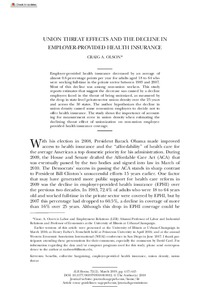Union threat effects and the decline in employer-provided health insurance

2019
72
2
March
417-445
health insurance ; trade union role ; trade unionization
Social protection - Health policy
https://doi.org/10.1177%2F0019793918818812
English
Bibliogr.
"Employer-provided health insurance decreased by an average of almost 0.6 percentage points per year for adults aged 18 to 64 who were working full-time in the private sector between 1983 and 2007. Most of this decline was among non-union workers. This study reports estimates that suggest the decrease was caused by a decline employers faced in the threat of being unionized, as measured by the drop in state-level private-sector union density over the 25 years and across the 50 states. The author hypothesizes the decline in union density caused some non-union employers to decide not to offer health insurance. The study shows the importance of accounting for measurement error in union density when estimating the declining threat effect of unionization on non-union employer-provided health insurance coverage."
Digital;Paper
The ETUI is co-funded by the European Union. Views and opinions expressed are however those of the author(s) only and do not necessarily reflect those of the European Union or the ETUI.